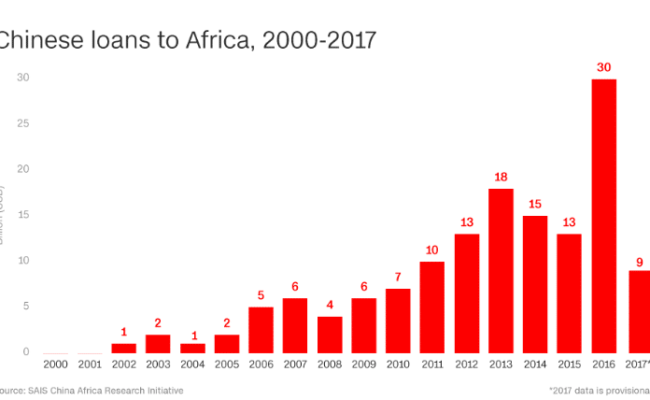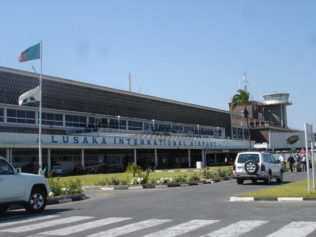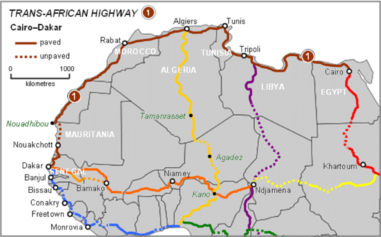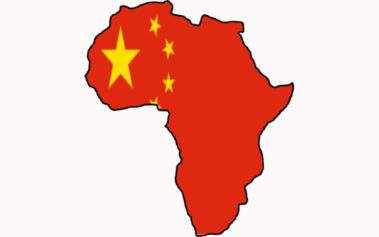
The government of Sierra Leone has cancelled its $318 million Mamamah International Airport project, which was to be financed and built by Chinese interests. (photo: awoko.org).
In the first example of an African nation canceling an already existing Chinese-funded project, the government of Sierra Leone has canceled a plan to build a $318 million airport outside Freetown through a Chinese contractor and Chinese loans.
Originally slated for completion in 2022, the Mamamah International Airport was to be built by the company China Railway Seventh Group, which has built highways and bridges across the continent, and funding supplied by China Exim Bank. The project had suffered from concerns over transparency.
“After serious consideration and diligence, it is the Government’s view that (it) is uneconomical to proceed with the construction of the new airport when the existing one is grossly underutilized,” said the Sierra Leone minister of transport and aviation in a letter to the director of the airport project, according to the Sierra Leone Telegraph. The Telegraph described the “vanity” international airport, which the Chinese were contracted to build, manage and maintain, as dead. Critics such as the World Bank and IMF have expressed concerns over the massive debt burden Sierra Leone would incur. The World Bank questioned the cost-benefit feasibility of a new airport, given that the existing Lungi airport is under capacity, with fewer flights to and from the airport than in the past. Lungi airport has been redeveloped with a $200 million loan from the World Bank — with plans to build a $1 billion bridge to connect the airport to the capital city of Freetown — as part of a broader vision to transform Lungi into a hub for tourism and commerce.
With charges that China is ensnaring African countries in debt traps, the Mamamah project places the larger issue of African financial dependence on China into context. The Asian giant is the largest bilateral financier of African infrastructure, more than the African Development Bank (ADB), the European Commission, the European Investment Bank, the International Finance Corporation, the World Bank and the Group of Eight (G8) countries combined, according to the BBC.
China recently pledged an additional $60 billion to African nations as part of a so-called “win-win” cooperation policy that President Xi Jinping said, ”follows the principle of giving more and taking less, giving before taking and giving without asking for return.” This as China has flexed its muscle on the continent in terms of its security and defense presence in Africa, and has threatened the sovereignty of some African nations. Economically challenged nations such as Sierra Leone — one of the poorest nations in the world — find themselves with limited resources for providing health care, education and basic utilities. While Sierra Leone owes $220 million in Chinese debt, other nations have become beholden to China, which accounts for 70 percent of Kenya’s debt and 77 percent of Djibouti’s debt. The Democratic Republic of Congo owes China an estimated 25 percent of its $37 billion economy to China, and Zambia and Mozambique each owe between 10 percent and 25 percent. Zambia, which owes $6.4 billion to China, recently faced rumors of a Chinese takeover of that country’s state utility company.
African countries have accumulated a total of $130 billion in debt from China, and despite claims of non-intervention, leave themselves open to exploitation and arm-twisting, such as China applying pressure to African nations to cut diplomatic ties with Taiwan under the “One China” policy. A glaring example of the influence of Beijing in Africa is Addis Ababa, with its skyscrapers, roads, train system and African Union headquarters built by Chinese companies that make the Ethiopian capital appear more like a Chinese city by the day. Ethiopia has borrowed at least $12.1 billion from China since 2000, and is $29 billion in the red.
Meanwhile, China’s Cosco Shipping Co. plans to order 25 massive ships to move bauxite extracted from Guinea to ensure a steady flow of raw materials from Africa and facilitate aluminum production in China. Guinea has received a $20 billion loan from China — twice Guinea’s GDP — in exchange for Chinese access to the African nation’s bauxite. The deal comes without environmental safeguards and at the expense of the livelihoods of the local population. Guinea is one of the least developed countries in the world, yet it is one of the abundant sources of bauxite and iron ore in the world. There are concerns that China is engaging in neo-colonialism in Africa, funneling the vast resources out of the continent to bolster its own political and economic position, and saddling these nations with unpayable debt.
With increasing negative public opinion over “debt trap diplomacy” in nations with financial ties to China, some projects have unraveled or required a second look. Some countries outside of Africa had already scrapped their development projects with Beijing. For example, in August, Malaysia nixed $22 billion in China-related infrastructure projects because Prime Minister Mahathir Mohamad concluded they were not needed, would propel Malaysia further into debt and would allow China undue power in the southeast Asian nation. Further, Pakistan is having second thoughts about the $8.2 billion Chinese-financed renovation of its colonial-era railway due to heavy debt concerns and independence from foreign loans. And Sri Lanka may provide a cautionary tale to other developing nations, as it was forced to relinquish an entire port to China when it could not repay $13 billion borrowed to build it.
“When cooperating with African countries that include Sierra Leone, China has always adhered to the principles of equality-based consultations and win-win cooperation. I don’t think this particular project should be overblown as an indication of problems between the Chinese and Sierra Leone governments,” said Chinese Foreign Ministry spokesperson Lu Kang, indicating the latest news did not show signs of a rift between Sierra Leone and China.
Despite these reassuring words from Beijing, cancellation of the Sierra Leone airport project highlights the issue of African reliance on Chinese creditors, suggesting other African nations are following the story closely and taking notes.



